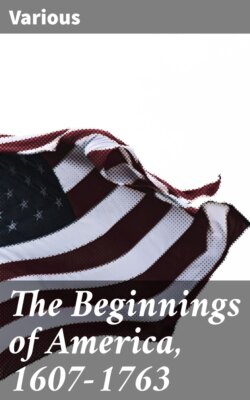Читать книгу The Beginnings of America, 1607-1763 - Various - Страница 3
На сайте Литреса книга снята с продажи.
Preface
ОглавлениеTable of Contents
The seventeenth century in America was the seedtime of colonization. For 115 years after Columbus discovered America, explorers sailed the western waters, and the nations of Europe staked out vast empires. England launched several successful attempts to plant colonies in what is now the United States. In the years following the landing at Jamestown in 1607, England laid the foundation for her extensive colonial system in North America. From these scattered colonies a nation grew, but a long time passed before the colonies became states and the states became a nation.
The English colonization of North America did not suffer for want of reporters to describe it. The people who took part in the enterprise wrote a great deal about their experiences. Governor Bradford of Plymouth wrote a history to preserve a record of the colony’s early days. Captain John Smith of Virginia wrote pamphlets to satisfy the curiosity of folks back home who might want to come to the New World. Many of these works were printed immediately; others remained in manuscript until our day.
Not only the leaders of the colonies wrote of their deeds. Ordinary people also sent letters home to England and kept diaries for their personal satisfaction. All in all, the United States had her beginnings amid ample publicity. We are grateful to these people for preserving records of the early days, for through their efforts we can get a first-hand idea of colonial times. We don’t have to guess about the events that took place in America three hundred years ago. Of course, we don’t have nearly as many documents as we could wish for, but we do have plenty of records to draw upon.
This is the first of a series of booklets containing the story of America, as told by those who were there, the eyewitnesses and participants. The selections which make up this booklet are a few of the records that historians use in writing their books. These diaries, letters, biographies, and narratives are the raw material of history. These accounts bring us face to face with the Indians of Virginia in 1607, make us feel something of the sufferings of the Pilgrims in Massachusetts during their “starving time,” tell us about the deep religious beliefs of the colonists, and the superstitions, like witchcraft, which were hard to root out. We see life through the eyes of a prosperous planter in Virginia and a struggling printer’s apprentice in Philadelphia. History books can provide over-all pictures of a country’s development, but these eyewitness accounts and first-hand reports put flesh on the bare bones of history.
In editing this booklet, we have let the authors tell their own story in their own words, but we have sometimes modernized the spelling and punctuation and—when it seemed absolutely necessary—words and sentence structure. Our aim has been to turn the language of these old documents into English modern enough that what the writers have to say is not obscured by the way they said it. Occasionally we have made cuts within selections to save space, but, for the most part, the material used is complete.
Richard B. Morris James Woodress
